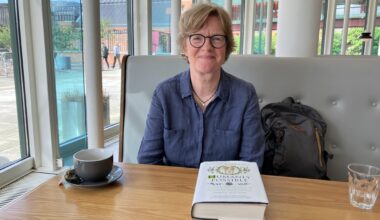
Introduction
Dr Jerry Coyne is an emeritus professor in the Department of Ecology and Evolution at the University of Chicago known for his work in speciation. His 2009 book Why Evolution is True has made an important contribution to the popularisation of science and helped to ensure that the public has a basic understanding of a subject so contentious in the US. During the 1990s and 2000s, he was at the forefront of the battle to keep creationism and ‘intelligent design’ out of science classes in American schools. He writes frequently on his website ‘Why Evolution Is True’ and is also the author of Speciation (with H. Allen Orr; 2004) and Faith vs. Fact: Why Science and Religion are Incompatible (2015).
We were both guest speakers at the eighth Silesian Science Festival Katowice in Poland early last December and he kindly agreed to this interview. The transcript, lightly edited for concision and clarity, is below.
Interview
Samuel McKee: You have been researching and campaigning for evolutionary biology for such a long time now. Are you excited about where evolutionary biology is going?
Jerry Coyne: There are always new things happening that are interesting and exciting. A long time ago John Horgan wrote a book called The End of Science where he said that there were no more big things to find out. Since then we have discovered black holes, dark matter, and CRISPR in the biology realm. That is what excites me—not straight genetics or evolution but what gives us the ability to change in extremely interesting ways on the practical level.
On the other hand, I just read Francis Collins’s book which is about how to reconcile science and religion. I was not very keen on that because I don’t think that’s possible. There are also people like George Church who think they can manufacture extinct animals using CRISPR. Now I don’t agree with that because what he is making is a hairy elephant, not a woolly mammoth. But the ability to change genes at will is one of the more exciting things.
And the thing about science, which always got me interested, is that you never know what’s going to happen. I mean, who knew that discovering that bacteria could grow in boiling-hot pools in Yellowstone would lead to CRISPR? It would lead to PCR, gene cloning, gene sequencing, and then CRISPR. So yes, I am very excited and this is one reason why I would like to be immortal—to see what comes next.
You have mentioned that creationism and intelligent design are on the decline in America, which is positive. What would you attribute that to?
First of all, America is becoming less religious over time. I think everywhere in the world except for the Middle East or perhaps the Far East has become less religious. There is a definite connection between acceptance of creationism and religion. I once plotted on a graph as many countries as I could to see how much their inhabitants believe in creationism and it is a straight line: the more religious you are and the more you believe in God, the less likely you are to accept evolution—because people get their religion before they hear about evolution. So there is definitely a conflict.
In America, you have the ‘nones’: people with no established faith. They are about a quarter of all Americans. Also, the intelligent design people have not made a good case for their science. One by one they are just fading out of sight now. They are still writing books and some are quite good sellers because there are still a lot of creationists in America. If you add up the people who are biblical creationists plus the theistic evolutionists that comes to about 71% of Americans, so it is still nearly three out of four of us. But the number of people who accept naturalistic evolution has risen since 1982, when I started teaching, from about 9% to 25%.
That’s great, very encouraging.
I think after the Kitzmiller v. Dover trial in 2005, when the intelligent design crowd failed to get their textbook adopted, people realised that this was not something that could be taught in schools. Even the Discovery Institute said ‘No, no, we should not teach ID in schools’ because they knew what the outcome would be. So I don’t have to give so many lectures about creationism anymore.
That must be nice!
I do like to talk about the subject of my talk tomorrow, ‘Why Evolution Is True’, the topic of my first book, because people don’t know why evolution is true. They just accept the word of scientists but it is very easy to explain all the data and how it comes together. I mean there’s the fossil record, then biogeography, then development, and plenty of things like that.
When I was an undergraduate at Cambridge, they said that evolutionary biology at that time—the 2010s—was the fastest-growing biological science there was because advances in genetics made it such a practical and mathematical science.
Oh yeah! It is very much a molecular endeavour. In fact, even in my lab, I had to hire a molecular person because we needed to know some answers. Today in order to do evolutionary biology properly you need to know, if you are studying more than one species for example, the taxonomy of the relationship and the best way to do that is with DNA. But there are many other questions. I think someone just discovered, I saw it yesterday, the small RNA that changes the peppered moth.
Really? The molecular mechanism? Wow.
Yes. It is very interesting because it is not a sequence of the gene, which many might have expected. Everybody would have automatically assumed that, but it’s a small RNA molecule.
Last month I was at Richard Dawkins’s farewell tour, and he actually didn’t talk about God that much. He was a lot more concerned about cultural rejections of science, attacks on science as a discipline, and the rise of belief in pseudoscience and conspiracy theories. Do you notice the same things and have the same concerns?
Oh yeah, absolutely. So the left is science-friendly in America and consider themselves more so than the conservatives. But the left now has this peculiar ideological view that whatever they see as moral is what you have to find in nature. I’m quite involved with that debate and gave a talk on it recently.
My friend and I wrote a paper in Skeptical Enquirer about how the left has attacked evolutionary biology for ideological reasons. One of the things I became quite involved with is the false notion that there is a spectrum of sex: that there are not two sexes but that sex is a continuum. That’s mainly a belief of the left and it comes purely out of ideology because there are so many people that identify as non-binary. Trans awareness is growing and I am all in favour of people adopting whatever gender they want, but they can’t adopt whatever sex they want—because there is a good biological definition of sex.
But when you say that sex involves males making small mobile gametes and females making large sedimentary gametes, that is considered not only offensive to the left but transphobic. So I have to spend a lot of time explaining this. I have been accused of transphobia many times, even though I have said I have nothing against trans people, simply for explaining biology.
Many biologists have faced similar things in the UK.
Why would humans be the only mammals that can change sex? There is only one reason, and that is because we have a culture and psychology so people can say ‘I feel like a different sex’ and for some reason, sex is the only trait in humans where your psychological notion of yourself can change biological reality. I mean, anorexic people think they are fat but they are not. Their belief doesn’t make them fat. I don’t think it is transphobic to say that this is reality. [Note: Coyne resigned from the Freedom From Religion Foundation’s board of honorary directors on 29 December after his article on this issue for their blog was peremptorily taken down. He was shortly followed in this by Steven Pinker and Richard Dawkins. More details here.]
We are here at a festival with thousands of young people. What excites you about getting the next generation interested in science, and how hopeful are you for the next generation?
Well, I have talked to fewer young people since I retired. I can’t say I am excited so much as concerned. What I am concerned about is that they learn respect for reality without this ideological pollution of science. It is probably more pervasive in America, but it is really doing science a bad turn these days. So I am hoping that young people will learn how to think critically. And I hope they will be able to distinguish reality from wishful thinking. I would like to see more courses on critical thinking; that is for the philosophers to come in and sort out.
Thank you so much.
Related reading
‘Religion is a killer now’: interview with Professor Peter Atkins, by Samuel McKee
Reality always wins: the perils of ideological science, by Samuel McKee
80 years on from Schrödinger’s ‘What Is Life?’, philosophy of biology needs rescuing from radicals, by Samuel McKee
Rescuing our future scientists and engineers from quitting before they start, by Samuel McKee
Is ‘intelligent design’ on the cusp of overthrowing evolutionary science? by Samuel McKee
The Galileo of Pakistan? Interview with Professor Sher Ali, by Ehtesham Hassan
‘We are at a threshold right now’: Lawrence Krauss on science, atheism, religion, and the crisis of ‘wokeism’ in science, by Daniel James Sharp
Consciousness, free will and meaning in a Darwinian universe: interview with Daniel C. Dennett, by Daniel James Sharp
‘A godless neo-religion’ – interview with Helen Joyce on the trans debate, by Emma Park
On sex, gender and their consequences: interview with Louise Antony, by Emma Park
‘An animal is a description of ancient worlds’: interview with Richard Dawkins, by Emma Park
Linnaeus, Buffon, and the battle for biology, by Charles Foster
‘The Genetic Book of the Dead’: A Dawkinsian Medley, by Daniel James Sharp
From stardust to sentience: How scientific literacy can improve your ability to foster gratitude, by Mohadesa Najumi








Your email address will not be published. Comments are subject to our Community Guidelines. Required fields are marked *
Donate